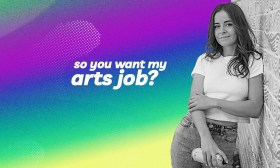Once upon a time in London, observes Seven Seven Contemporary Art founder Alan Bond, artists were dependent on commercial galleries and public institutions for their audience. However, times have changed and, says Bond, the proliferation of artist-led galleries in London’s East End highlight the fact that ‘there are a lot more talented artists around than the commercial galleries can support.’
Established by Bond and Clare Fienley in 2001, Seven Seven is an artist-led gallery in Hackney, which showcases the work of emerging artists working both nationally and internationally. According to Bond, a slow unfurling of the gallery’s philosophy in the time since its establishment has lead to a focus on emerging artists and the local community.
‘We’re trying to deal with emerging artists and to establish ongoing relationships with them,’ he says. ‘And we also live in an area that is full of galleries – there are about 80 independent galleries in East London – so it’s important to try and form our own identity.’ In regard to a gallery identity, Bond continues, ‘we’re trying to be embedded in the community, and embedded in the arts scene.’
Certainly Seven Seven’s latest exhibition, Mirror II Nature, fits neatly within the framework of a space which, according to the gallery’s statement, ‘aims to develop a dialogue with the public through our exhibitions and activities.’ The exhibition, which, as Bond explains, involves 12 artists of different disciplines, explores the representation of nature within urban contexts, and presents art influenced by issues prominent in public discourse: whether London Mayor Ken Livingstone’s ‘war on pigeons’, environmental degradation or the war on Iraq.
Bond says that the impetus for Mirror II Nature came from the ‘idea that lots of people who live in cities have almost a kind of more focused interest in nature than those who live in the country. We’re more aware of environmental degradation in the city,’ he says.
The concept also worked to build on a 2002 Seven Seven exhibition, entitled Mirror and also curated by Bond, which explored the concept of art as a mirror to nature. Bond recalls it as successful, and says the theme was one in which people were interested. Some of the artists from the previous exhibition have worked with Bond again on Mirror II Nature, but Bond says that a bigger space, at the Mile End Art Pavilion, has enabled the artists to bring different elements to their work.
Included among these artworks is Dawn Shorten’s ‘remote controlled cloud’, built around a helium balloon with two motors and sculpted from cotton; photographs of ancient museum cases from Peter Benson; Mary Cornet’s representation of the delicate silhouettes of seedlings presented in a perspex plant stand and Maslen & Mehra’s work, Dirty Dozen, which shows sculpted pigeons photographed with live ones at Trafalgar Square.
Maslen & Mehra (Tim Maslen and Jennifer Mehra), of London’s VOID gallery, have according to Mehra’s own admission, a history of making work based in nature. As a result, says Mehra, a question which continually confronts the artists is: ‘What is nature?’
For their Mirror II Nature work, Mehra says the duo were attracted to the idea of the Trafalgar Square pigeons as both urban creatures and familiar characters. However, the work also exists as a potent political reference point – to London Mayor Ken Livingstone’s ‘war on pigeons’ and the recent war on Iraq.
‘It’s been kind of a political thing in London as well, because the Mayor of London is waging a war on pigeons,’ Mehra says. ‘Trafalgar Square is famous for pigeons… But now [Mayor Livingstone] wants to clean up London and get rid of them… there are signs up everywhere, and you’re not allowed to feed them. You’ve got a group of people called the Pigeon Alliance who go down there at seven o’clock every day and feed [the pigeons], and then after that no-one is allowed to feed them. There are some pretty mixed up pigeons!’
Maslen & Mehra’s work involves photographs of 12 sculpted pigeons sharing space with the Trafalgar Square locals. The artists will also exhibit the sculptures, as a floor piece, in addition to another piece of work – ‘Ken Livingstone’s Most Wanted Playing Cards,’ in which the artists play on the Iraqi Most Wanted playing cards, issued to soldiers in the aftermath of the war on Iraq.
‘We sent away for the [original] cards,’ says Mehra. ‘And we’ve looked at the cards in the Iraqi pack and kind of copied the style. There’s a little pigeon portrait on each card and we’ve written all the copy and changed the names… mocked it up completely, and we’ll be exhibiting both sets of cards.’
With their work, Maslen & Mehra probably fall into the category of artists who, Bond says, ‘are interested in finding nature in the city.’ Certainly, for Mehra, the attraction of Mirror II Nature was the idea of working with different artists to explore different perceptions of the theme.
‘There are so many different levels to nature, and the perception of nature is changing a lot,’ she affirms. ‘[Mirror II Nature] attracted us because of the changing perception of nature, and the idea that it can be found in the city and [that it] doesn’t necessarily have to be found in a pristine sense. And I think people have brought to [the theme] there own ideas about what nature is.’
‘Mirror II Nature’ will run at the Mile End Art Pavilion, Mile End Park, from June 26-July 13. For more information on Seven Seven Contemporary Art, visit the website HERE.
DATES: June 26 – July 13
VENUE: Mile End art pavilion, Mile End Park, end of Ashcroft Rd E3



